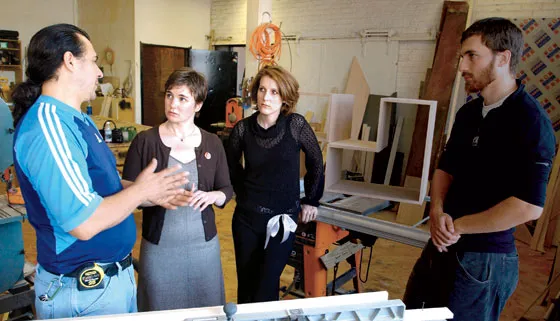The Institute for Justice Clinic: Ten Years of Helping Chicago Entrepreneurs

Helping inner-city entrepreneurs build lives, fortunes, and families through small business is the mission of the Institute for Justice Clinic on Entrepreneurship, a joint effort of the Law School and the Washington-based Institute for Justice. For ten years, the clinic has helped a diverse array of new enterprises to understand and meet the administrative and regulatory demands of their endeavors.
“We’re very focused on working with small businesses in the inner city and with the underserved,” explains Elizabeth Milnikel, the current director of the clinic. “Over time, we are learning a lot more about the obstacles involved in starting a business in these areas, and we are trying to get more help for those who need it. Just this year, we did a lot of research on the regulations and licensing requirements for those starting entry-level businesses, and we are working as a group to get that information out there for other entrepreneurs.”
Having helped businesses from cafés and daycares to dance companies and hair-braiding salons, the Institute for Justice (IJ) clinic is generally viewed as a success in the business world. Among its successes are the Sweet Maple Café in Little Italy, which serves down-home favorites for breakfast and lunch, and the Perfect Peace Café and Bakery in the Auburn-Gresham community. By opening a clean, stylish bakery in a block that had previously been abandoned, the bakery is drawing new business and interest to the area.
The clinic is also acknowledged as a valuable part of the legal education of the twenty or so students who work there each year, who gather valuable experience in transactional law work. Working with low-to-moderate income clients, students file incorporation paperwork and help business owners to qualify for trademarks and to meet the ever-changing regulations instituted by both the city and state for new enterprises.
“Potentially, we would serve any business that would help the people of Chicago and could be taken to fruition in one school year,” notes Patricia Lee, the clinic’s original director, who now works with Conflict Resolution Center of Montgomery County, MD. “While helping the new businesses is important, the clinic is also a teaching tool, and we had to have projects that enabled the students to follow the process of starting a business all the way through.”
Students also work on legislative and policy reform designed to ease some of the obstacles many new businesses face. In the past, students have testified before subcommittees and even before Congress about how the Small Business Administration can help underserved entrepreneurs.
“Sometimes, we find that there are regulations that just don’t make sense,” observes Milnikel. “And we try to do something about that.”
Using seminars, pamphlets, and working with the media, the IJ clinic is reaching an ever-widening audience of potential business owners. Each year, it receives more applications, from both clients and students, than it can fulfill and it is an acknowledged asset for the Law School. Yet, when the clinic was first conceived, there was considerable opposition to its establishment.
Because the Institute for Justice is a libertarian organization, some students and faculty felt that students with more liberal views would be prevented from participating in the clinic. Further, in 1997, when Mark S. Chenoweth and James C. Ho, two second-year law students, proposed the creation of the clinic, there was worry that there was insufficient faculty expertise in transactional law to support the work of the clinic. And since the Mandel Legal Aid Clinic, at the time, specialized in litigation, the IJ clinic might have seemed a bad fit.
But ultimately, these concerns turned out to be misplaced. Faculty with expertise in transactional law was hired, and students of all kinds have helped to create stronger businesses and stronger communities throughout Chicago. And the clients have helped the students to understand the many issues confronting underserved communities.


